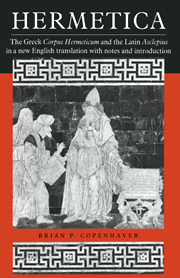 Hermetica
Hermetica Book contents
- Frontmatter
- Contents
- Preface
- Introduction
- Bibliography and abbreviations
- Corpus Hermeticum I
- Corpus Hermeticum II
- Corpus Hermeticum III
- Corpus Hermeticum IV
- Corpus Hermeticum V
- Corpus Hermeticum VI
- Corpus Hermeticum VII
- Corpus Hermeticum VIII
- Corpus Hermeticum IX
- Corpus Hermeticum X
- Corpus Hermeticum XI
- Corpus Hermeticum XII
- Corpus Hermeticum XIII
- Corpus Hermeticum XIV
- Corpus Hermeticum XVI
- Corpus Hermeticum XVII
- Corpus Hermeticum XVIII
- Asclepius
- Notes
- Indexes
Corpus Hermeticum XVIII
Published online by Cambridge University Press: 05 September 2013
- Frontmatter
- Contents
- Preface
- Introduction
- Bibliography and abbreviations
- Corpus Hermeticum I
- Corpus Hermeticum II
- Corpus Hermeticum III
- Corpus Hermeticum IV
- Corpus Hermeticum V
- Corpus Hermeticum VI
- Corpus Hermeticum VII
- Corpus Hermeticum VIII
- Corpus Hermeticum IX
- Corpus Hermeticum X
- Corpus Hermeticum XI
- Corpus Hermeticum XII
- Corpus Hermeticum XIII
- Corpus Hermeticum XIV
- Corpus Hermeticum XVI
- Corpus Hermeticum XVII
- Corpus Hermeticum XVIII
- Asclepius
- Notes
- Indexes
Summary
[1]If someone promises to bring harmony out of a piece of music played on many instruments, his effort will be laughable if during the performance discord among the instruments hinders his zeal. Since weak instruments are altogether unequal to the task, inevitably the spectators will jeer at the musician. Indeed, while this well-meaning person gives tirelessly of his art, (the hearer) finds fault with the weakness of the instruments. He who is truly a musician[]by nature, not only producing harmony in song but also providing the rhythm of the music appropriate to each instrument, this tireless musician is god, for it does not befit god to tire.[2]If ever a performer wanted to excel in a musical contest, entering just after the trumpeters had likewise shown their skill, after the flautists had produced sweet music on their melodious instruments, after 〈others〉 had finished the singing of the song with reed-pipe and plectrum, no one would blame the musician's inspiration 〈if his instrument failed under the strain〉, nor would they blame the almighty, to whom they would render due honor while finding fault with the defective instrument because, in fact, it created a hindrance to greater beauty by hindering the musician's rapport with the music and robbing the audience of sweet song.
[3]With us it is the same. Let no spectator irreverently find fault with our kind for weakness that belongs to the body.[…]
- Type
- Chapter
- Information
- HermeticaThe Greek Corpus Hermeticum and the Latin Asclepius in a New English Translation, with Notes and Introduction, pp. 63 - 66Publisher: Cambridge University PressPrint publication year: 1992


